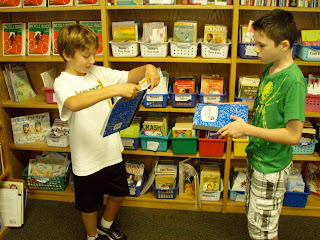
Writers Workshop sets in motion a process of near daily writing experiences and lessons across the curriculum. Students will explore many genres of writing including: personal narrative, short fiction, persuasive essay, poetry, literary essay and historical fiction time permitting.

Writing sessions follow these steps. We begin with a mini lesson for the entire group in which I model (with my own writing or a piece of literature) something I want everyone to work on that period. Students write quietly at their desks for 20 to 3o minutes and frequently longer. During that time I move around and check on students progress and meet one on one with most. Later in the hour, students are encouraged to conference with their writing partners. These conferences feature each writer asking the other to explain what he or she is trying to accomplish with this particular piece of writing. This is when the helpful hints and encouragement are exchanged.

Students originally write in their journals. Second or third drafts are word processed and saved. Near the end of the process with any given piece of writing, students work from various checklists that assist them to improve their word choices, sentence variety, spelling, grammar, punctuation and voice.

Finally a piece is ready to be published. These final word processed pieces are analyzed by both student and teacher using the same rubric which has been specifically designed to evaluate each genre.

Sometime each trimester we hold a public reading/celebration in which our student-authors share their writings. These collected writings are "bound" in a permanent booklet with student designed cover art.

Students are working on several poems, a personal narrative and a piece of short fiction. They are also beginning to "journal" their reactions to the novel A Land Remembered which I am reading to them. This provides an introduction to an important first step in writing a literary essay.

Our writing year began with my wife giving an informal talk on her life as a writer. She shared her insight that all writers are readers, observers of human behavior and note takers.

Here's a list of the mini lessons the class has experienced thus far.
Writers are readers, observers and note takers
A writer’s life discussed
During Writer’s Workshop everyone writes and shares including the teacher.
Stories/writing ideas come from everywhere
Writing from a prompt: sticker story
Why writers cross out instead of erasing
Importance of sentence variety
Writer’s Workshop procedures reviewed
Writers read their writings to each other.
Writers compliment each other and offer helpful hints.
Writers ask, “What are you trying to do with this?”
Writers reflect on what: they’ve learned about, are pleased with and/or need to improve.
About conferencing with the teacher, editing and word processing
“The Important Book” poetry project
Introduction to praise poem (ode) writing: “an electrical device we can’t live without”
Literature helps us understand various genres of writing
Personal Narrative introduced: “TV and Me”
Brainstorming and listing possible first experiences or important small moments recalled
Difference between personal narrative and memoir
About “voice:” how to get your writing to “sound” like you…..(example: Connor’s personal narrative about remodeling his house.)
Special paragraphing when writing dialogue
Describing characters: add appearances, mannerisms and personality traits of people around you observe
Importance of planning (inspiration style webbing etc.) either before writing soon after starting; revising as you go along
No comments:
Post a Comment